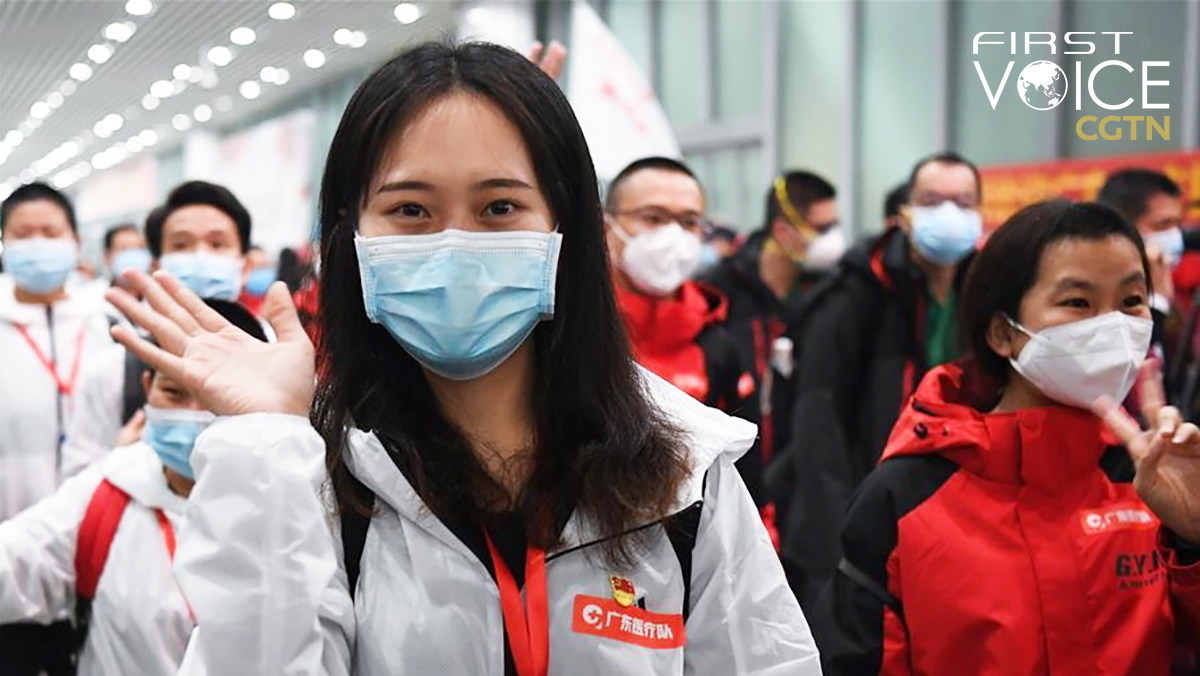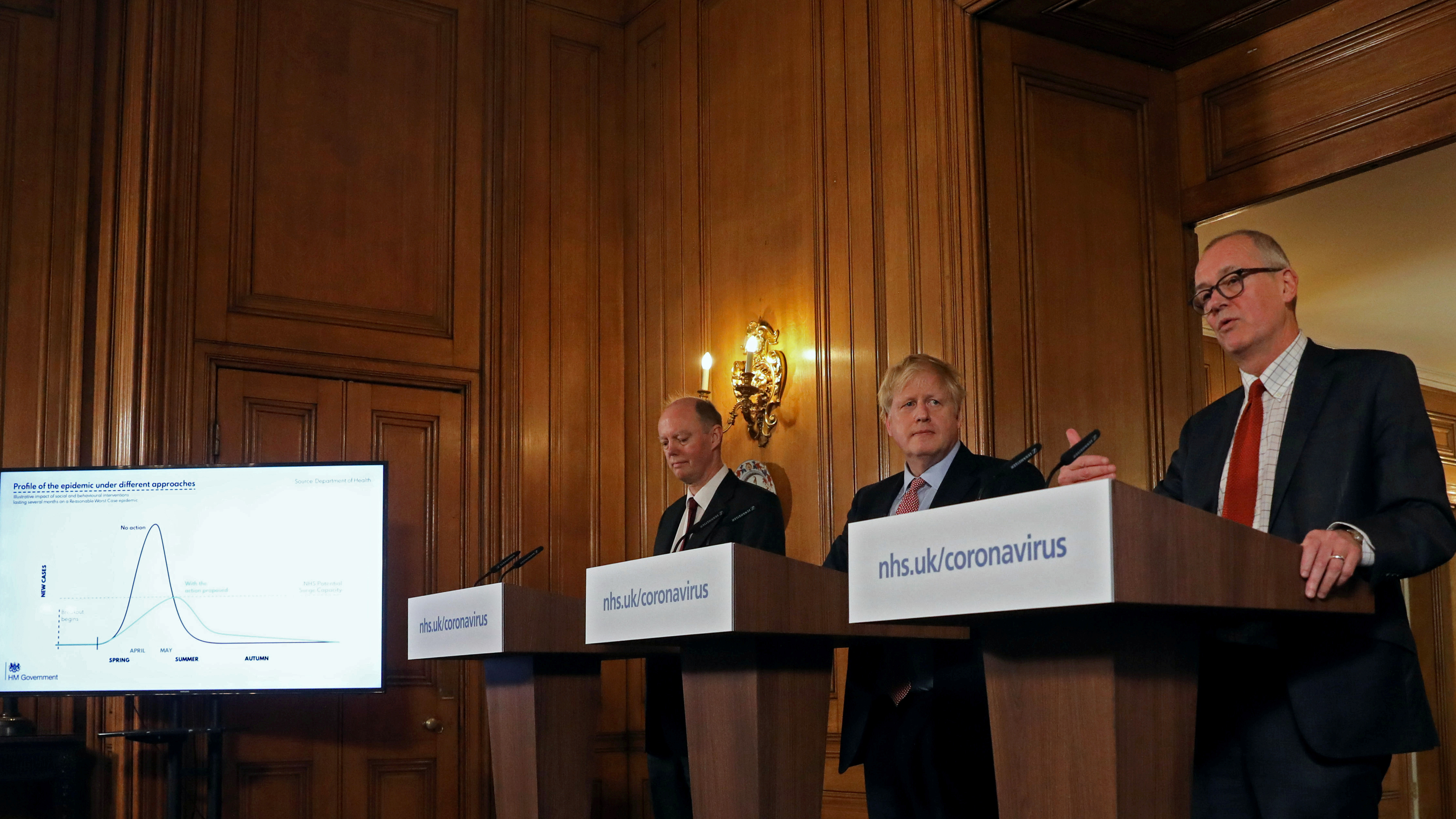
At the peak of the coronavirus outbreak, medics from across China rushed to Wuhan to offer help. /CGTN
At the peak of the coronavirus outbreak, medics from across China rushed to Wuhan to offer help. /CGTN
Editor's note: CGTN's First Voice provides instant commentary on breaking stories. The daily column clarifies emerging issues and better defines the news agenda, offering a Chinese perspective on the latest global events.
On March 24, two months after central China's Hubei Province was put under lockdown, an encouraging news came out that transportation will resume in and out of the province (except the capital city of Wuhan) starting March 25. Wuhan, the ground zero of the coronavirus epidemic, will also be reopened for traffic on April 8, meaning the blockade on all of its inter-provincial roads, railways, and airways will be lifted.
The decision to lock down the province, taken in late January, was unprecedented but not without controversy at the time. Concerns arose, especially among China's international observers, as to whether people within Hubei would have access to adequate medical resources or the required rigorous medical care.
Accompanied with tight traffic restrictions in the region, the country, as a whole also saw a dramatic halt in most of its economic activities as this was seen as necessary by the government to limit the spread of the virus. This raised another question among some about whether China was paying too high a price for fighting this war against COVID-19.
However, in retrospect, these measures have all proven effective and necessary in handling a situation like this. Two months on, the local transmission of the virus has almost disappeared in China.
But more importantly, they were also a series of decisions that China was "forced" to take at the time given the intensity of the epidemic and how fast it spread. With a daily increase of new cases surpassing 3,000 in the early stage, a large number of patients were desperately seeking help and overwhelmed the country's healthcare system. If the virus was allowed to travel freely, the country may have seen a huge explosion in cases in all corners and an even higher death toll.

Boris Johnson (C) addresses a press conference on the public health crisis in London, UK. /AFP
Boris Johnson (C) addresses a press conference on the public health crisis in London, UK. /AFP
Now outside China, something similar has been happening - hospitals are swamped and medical resources overstretched in countries like Italy, Spain and the U.S. Many patients are suffering and cannot receive proper treatment due to severe shortages of medical supplies and medical equipment like ventilators. Medical staff is also put at high risks, having to work long hours taking care of patients without sufficient personal protective gear.
What happened there could easily invoke an emotional reaction by a Chinese person who once witnessed distress of no less degree in the country. It is important to note that human suffering like this is also a major factor prompting China to take drastic steps. Concerns over the lockdown decision, as mentioned in the beginning, were alleviated as Hubei subsequently received unprecedented support from all parts of China with medical teams from other provinces coming to lend a hand and medical supplies being sent to the region, a result of the ramped-up national production.
And now having the COVID-19 under control, tending to the country's economic growth can be treated as the next priority and it can be done so with more ease given the increased certainty about the trajectory of the epidemic.
In the West, many people, including medical professionals, have been asking why their governments have been acting so slow. Instead of acting much earlier and more comprehensively, there has only been a trickle of measures slowly rolled out in the past weeks.
To add insult to injury, there is still the grotesque scene where leaders, like U.S. President Donald Trump, are still doubtful about going hard against the pandemic. Trump on Monday appeared unsure of how long the lockdown measures in the U.S. should last, saying the U.S. should be a country "open for business," not being shut down. This is alarming as the Johns Hopkins pandemic expert Tom Inglesby warned on March 24, ending soical distancing now "could kill potentially millions in the year ahead with huge social and economic impact across the country." The country's top infectious disease expert Dr. Anthony Fauci also said the alternative of not acting aggressively will be letting people die, which will be an extremely immoral choice to make.
With lockdown being lifted in its worst affected area after two months, China's experience should thus serve as a lesson where quick, targeted and coordinated actions are needed to protect people's lives. This is not to say that every country should follow China's path or take the exact same measures, since actions taken in different parts of the world should cater to local conditions. But it is significant at this moment to heed the advice of medical professionals and view saving people's lives as a priority which European leaders have gradually come to understand. As the former Prime Minister of Australia Kevin Rudd commented in a recent discussion organized by think tank Asia Society, in a situation like this, overreaction is much better than inaction.
Script writer: Xu Sicong
(If you want to contribute and have specific expertise, please contact us at opinions@cgtn.com.)